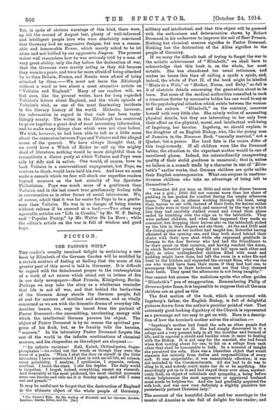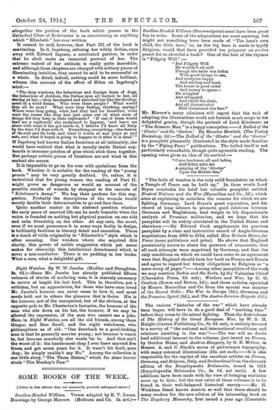FICTION.
THE PASTOR'S WIFE.* THE reader's usually unmixed delight in acclaiming a new book by Elizabeth of the German Garden will be modified by a certain mixture of feeling at finding that the scene of the greater part of this novel is laid in Germany. It is difficult to regard with the detachment proper to the contemplation of a work of art names which stand out in letters of fire in our daily newspapers—East Prussia, Konigsberg, Berlin. Perhaps we may take the story as a wholesome reminder that life is not all war, and that behind the barbarities of the German Army stands the German people, full of zeal for matters of intellect and science, and as vitally concerned as we are with the domestic drama of everyday life. Another lesson, too, may be learnt from the portrait of Pastor Dremmel—the unremitting, unrelenting energy with which the intellectual German pursues his object. The object of Pastor Dremmel is by no means the spiritual pro- gress of his flock, but, as he frankly tells the heroine, " manure." In his laboratory Pastor Dremmel forgets the rest of the world in the infinite combinations of chemical manure, and his rhapsodies on the subject are eloquent :- "
Its infinite varieties! Kali, Kainit, Chilisaltpetre, Super- phosphates '—he rolled out the words as though they were the verse of a psalm. 'When I shut the door on myself in the little laboratory I have constructed I shut in with me all life, all science, every possibility. I analyse, I synthesize, I separate, reduce, combine. I touch the stars. I stir the depths. The daily world is forgotten. I forget, indeed, everything, except my research. And invariably at the most profound, the most exalted moments some one knocks and tells me it is Sunday again, and will I come out and preach.'" It may be useful not to forget that the destruction of England is the ultimate object of the whole people of Germany, • The Pastor's Wife. By the Author of Elizabeth and her German Garden. London : Smith, Elder, and Co. [63.]
military and intellectual, and that this object will be pursued with the enthusiasm and determination shown by Robert Dremmel in his endeavour to improve the soil of East Prussia.
Nothing but chemical manure signifies to Pastor Dremmel. Nothing but the destruction of the Allies signifies to the people of Germany.
If we essay the difficult task of trying to forget the war in the artistic achievement of " Elizabeth," we shall have to acknowledge that this book is, on the whole, her most notable. She has abandoned her usual reticences, and makes no bones this time of calling a spade a spade, and, indeed, the whole of Part II. of the book might be labelled "Hints to a Wife," or "Mother, Nurse, and Baby," so full is it of obstetric details concerning the generation about to be born. But none of the medical authorities consulted in such a tremulous flutter by successive brides has one word to say as to the psychological situation which exists between the woman and the unborn. "Elizabeth," on the contrary, concerns herself with very little else. She calmly writes of nauseating physical details, but they are interesting to her only from their effect on the physical, moral, and intellectual well-being
of Ingeborg, her heroine. Ingeborg, we should explain, is the daughter of an English Bishop, who, like the young man of Jamaica in the Nonsense Book, " casually married," not a Quaker, but a pastor. Her bard fate is the raison d'être of this tragi-comedy. If all children were like the Dremmel babies, the situation to the expectant mother would be one of unrelieved gloom. Indeed, the extraordinarily exasperating quality of their stolid goodness is unnatural ; that is, unless we believe in a remark made by a character in one of "Eliza- beth's" earlier works, that German children are quite unlike their English contemporaries. What can surpass in unattrac-
tiveness children who take no advantage of being left to themselves P-
"Robertlet did not turn on Ditti and seize her dinner because she was a girl ; Ditti did not conceal more than her share of pudding in her pocket for comfort during the empty afternoon hours. They sat in silence working through the meal, using their knives to eat with instead of their forks, for knives rather than forks were in their blood, and unmoved by the way in which bits they had carefully stalked round and round their plates ended by tumbling over the edge on to the tablecloth. They were patient children, and when that happened they made no comment, but dropping their knives also on the tablecloth picked up the bits in their fingers and ate them. At the end Ditti said the closing grace as her mother had taught her, Robertlet having officiated at the opening one, and they both stood behind their chairs with their eyes shut while she expressed gratitude in German to the clear Saviour who had had the friendliness to be their guest on that occasion, and having reached the Amen, in which Robertlet joined, they did not fall upon each other and fight, as other unshepherdod children filled with meat and pudding might have done, but left the room in a sober file and went to the kitchen and requested the servant Rosa, who was the one who would have been their nurse if they had had one, to accompany them to their bedroom and see that they cleansed their teeth. They spent the afternoons in not being naughty."
One cannot but accuse the malicious sprite who often guides "Elizabeth's" pen of exaggeration. Remembering Philip of Struwwelpetcr fame, it is impossible to suppose that all German children are as good as this.
The first section of the book, which is concerned with Ingeborg's father, the English Bishop, is full of delightful pictures drawn from the author's peculiar point of view. That extremely good-looking dignitary of the Church is represented as a personage not too easy to get on with. Here is a descrip- tion of how the heroine's mother solves the situation ;—
"Ingeborg's mother had found the sofa as other people find salvation. She was not ill. She had simply discovered in it a refuge and a very present help in all the troubles and turmoil of life, and in especial a shield and buckler when it came to dealing with the Bishop. It is not easy for the married, she had found when first casting about for one, to hit on a refuge from each other that shall be honourable to both. In a moment of insight she perceived the sofa. Here was a blameless object that would separate her entirely from duties and responsibilities of every sort. It was respectable ; it was unassailably effective; it was not included in the Commandments. All she had to do was to cling to it, and nobody could make her do or be anything. She accordingly got on to it and had stayed there ever since, mysteri- ously frail, an object of solicitude and sympathy, a being before whose helplessness the most aggressive or aggrieved husband must needs be helpless too. And she had gradually acquired the sofa look, and was now very definitely a slightly plaintive but persistently patient Christian lady."
The account of the beautiful Juliet and her marriage to the master of Ananias is also full of delight for the reader; and altogether the portion of the book which passes in the Cathedral Close at Redchester is as entertaining as anything which " Elizabeth " has ever written.
It cannot be said, however, that Part III. of the book is convincing. In it, Ingeborg, refusing her wifely duties, runs away with Edward Ingram, a celebrated painter, in order that he shall make an immortal portrait of her. The extreme naïveté of her attitude is really quite incredible, and although these chapters are charged with solitary pieces of illuminating intuition, they cannot be said to be successful as a whole. In detail, indeed, nothing could be more brilliant, witness this account of the effect of Milan on Ingeborg's mind :—
" The shop windows, the behaviour and foreign faces of dogs, the behaviour of children, the Italian eyes all turned to her, all staring at her.—they fascinated and absorbed her like the develop- ment of a vivid dream. Who were these people ? What would they all do next ? What were they feeling, thinking, saying ? Where were they going, what had they had for breakfast, what were the rooms like they had just come out of, what sorts of things did they keep in their cupboards ? 'If one of them would lend me a cupboard,' she exclaimed to Ingram, 'and leave me alone with what it has got inside it, I believe I'd know all Italy by the time I'd done with it. Everything, everything—the desires of its soul and its body, and what it works at and plays at and eats, and what it hopes is going to happen to it after it is dead."
If Ingeborg had known Italian furniture at all intimately, she
would have realized that what is usually inside Italian cup- boards is immense patches of glue which stick them together.
But perhaps artistic pieces of furniture are not what in this context she means.
It is impossible to go on for ever with quotations from the book. Whether it is suitable for the reading of the "young
person " may be very greatly doubted. Or, rather, it is undoubted that for young women the reading of Part II.
might prove as dangerous as would an account of the possible results of wounds by shrapnel to the recruits of " Kitchener's Army." We beg their pardons for this sug- gestion. Probably the descriptions of the wounds would merely double their determination to go and face them.
Quite another matter is the abstract question whether the early years of married life can be made bearable when the union is founded on nothing but physical passion on one side and calm friendship on the other. At any rate, the novel, even if we must pronounce it in some ways faulty in design, is brilliantly faultless in literary detail and execution. There is a touch of virile originality in " Elizabeth's " style which is often amazing. One wonders where she acquired this clarity, this power of subtle suggestion which yet never makes for obscurity, this intellectual detachment which is
never a non-conductor. There is no padding in her books. What a rare, what a delightful gift.



































 Previous page
Previous page